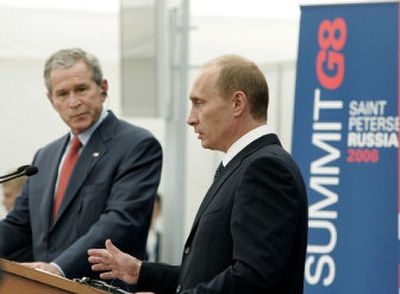Joint news conference oozes tension in Russia

STRELNA, Russia – President Bush and Russian President Vladimir Putin presented a united front Saturday in calling for a halt to violence in the Middle East, but their public show of solidarity barely masked a series of disagreements over democracy, trade and Iran.
Meeting separately before other leaders arrived for the Group of Eight summit, Bush and Putin agreed that fighting in Israel and Lebanon posed a grave danger but not on how to stop it. Bush failed to win Putin’s support for sanctions against Iran’s nuclear program. And round-the-clock talks to admit Russia into the World Trade Organization broke without a deal.
The undercurrent of tension became evident by the end of a polite but reserved joint news conference. Despite pressure at home and abroad, Bush went out of his way to avoid publicly criticizing Putin for stifling internal dissent, saying he did not want to lecture Russia. His only public comments on Russian democracy were to express understanding for Putin’s viewpoint on the subject and to delicately nudge him to expand freedom.
“I talked about my desire to promote institutional change in parts of the world like Iraq, where there’s a free press and free religion,” Bush said, “and I told him that a lot of people in our country would hope that Russia would do the same thing.”
Putin seized on that remark. “We certainly would not want to have the same kind of democracy as they have in Iraq, I will tell you quite honestly,” he said, provoking laughter from the Russian side.
Bush seemed caught off guard. “Just wait,” he replied softly, maintaining a strained smile.
The Putin jibe highlighted what has been perhaps Bush’s most anticipated meeting with a foreign leader all year, a meeting that focused worldwide attention on the state of Russia nearly 15 years after the collapse of the Soviet Union. As Russia hosts its first G-8 summit, it is showcasing its economic and diplomatic resurgence, but critics said it should not lead a group of democracies when the Kremlin has taken over independent television, imprisoned political rivals, eliminated election of governors and restricted opposition parties.
The situation led to months of heated debate in Washington and European capitals. Bush brushed off calls to boycott the summit and had Vice President Dick Cheney express U.S. concerns about Russian democracy in a tough speech two months ago, then resolved to be a good guest himself this weekend.
To demonstrate what Bush called a “very good” U.S.-Russian relationship, the two sides announced two nuclear agreements Saturday. The more significant, initially reported a week ago, will open the door to civilian nuclear cooperation between the countries. The other launches a global initiative aimed at preventing nuclear terrorism by improving control of nuclear material and facilities and hunting traffickers.
But the failure of WTO talks proved a powerful disappointment for one of Putin’s top priorities. Although 149 nations belong to the global trade group, Russia remains on the outside and the United States is the only one standing in the way of Russian membership.